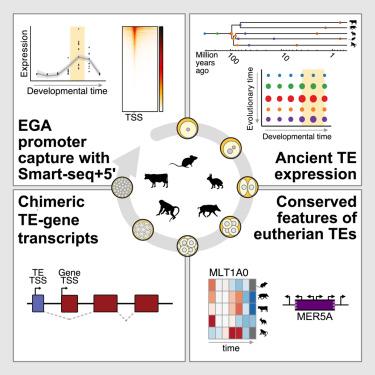An atlas of transcription initiation reveals regulatory principles of gene and transposable element expression in early mammalian development
IF 45.5
1区 生物学
Q1 BIOCHEMISTRY & MOLECULAR BIOLOGY
引用次数: 0
Abstract
Transcriptional activation of the embryonic genome (EGA) is a major developmental landmark enabling the embryo to become independent from maternal control. The magnitude and control of transcriptional reprogramming during this event across mammals remains poorly understood. Here, we developed Smart-seq+5′ for high sensitivity, full-length transcript coverage and simultaneous capture of 5′ transcript information from single cells and single embryos. Using Smart-seq+5′, we profiled 34 developmental stages in 5 mammalian species and provide an extensive characterization of the transcriptional repertoire of early development before, during, and after EGA. We demonstrate widespread transposable element (TE)-driven transcription across species, including, remarkably, of DNA transposons. We identify 19,657 TE-driven genic transcripts, suggesting extensive TE co-option in early development over evolutionary timescales. TEs display similar expression dynamics across species and species-specific patterns, suggesting shared and divergent regulation. Our work provides a powerful resource for understanding transcriptional regulation of mammalian development.

求助全文
约1分钟内获得全文
求助全文
来源期刊

Cell
生物-生化与分子生物学
CiteScore
110.00
自引率
0.80%
发文量
396
审稿时长
2 months
期刊介绍:
Cells is an international, peer-reviewed, open access journal that focuses on cell biology, molecular biology, and biophysics. It is affiliated with several societies, including the Spanish Society for Biochemistry and Molecular Biology (SEBBM), Nordic Autophagy Society (NAS), Spanish Society of Hematology and Hemotherapy (SEHH), and Society for Regenerative Medicine (Russian Federation) (RPO).
The journal publishes research findings of significant importance in various areas of experimental biology, such as cell biology, molecular biology, neuroscience, immunology, virology, microbiology, cancer, human genetics, systems biology, signaling, and disease mechanisms and therapeutics. The primary criterion for considering papers is whether the results contribute to significant conceptual advances or raise thought-provoking questions and hypotheses related to interesting and important biological inquiries.
In addition to primary research articles presented in four formats, Cells also features review and opinion articles in its "leading edge" section, discussing recent research advancements and topics of interest to its wide readership.
 求助内容:
求助内容: 应助结果提醒方式:
应助结果提醒方式:


